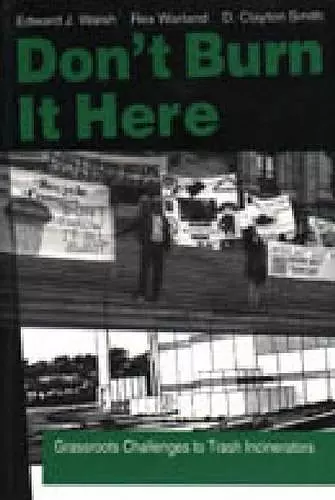Don’t Burn it Here
Grassroots Challenges to Trash Incinerators
Ed Walsh author Douglas Clayton Smith author Rex hanson author
Format:Hardback
Publisher:Pennsylvania State University Press
Published:17th Jul '97
Currently unavailable, and unfortunately no date known when it will be back
This hardback is available in another edition too:
- Paperback£34.95(9780271016641)

When first proposed in this country during the 1970s, waste-to-energy (WTE) incinerators appeared to be ideal solutions to the growing mounds of trash in our "throw-away" society. Promising to convert useless garbage into electricity while saving precious landfill space, trash incinerators seemed perfectly timed to respond to a national need. Within a decade, however, a grassroots anti-incineration movement emerged as a vibrant offshoot of the environmental movement. In Don't Burn It Here, sociologists Edward Walsh, Rex Warland, and D. Clayton Smith examine this grassroots movement through detailed analyses of the struggles surrounding proposals to build eight municipal incinerators in Pennsylvania, New York, and New Jersey.
The eight case histories that form the heart of the book are comparable to hundreds of others across the U.S. The authors' research is based on interviews, focus group discussions, extensive newspaper files, and questionnaire responses from participants on both sides of the conflicts. A final chapter examines the similarities and differences between the three successful projects and the five defeated ones. An overview of the history of the modern incinerator in the U.S. and the emergence of a major national opposition movement provides the necessary context, and throughout the book, the authors make useful comparisons to other national movements seeking legal justice for deprived collectivities such as women and ethnic groups.
This project was supported by a grant from the Ford Foundation's Fund for Research in Dispute Resolution. Striving to maintain a balanced treatment of both sides of the incinerator battles, the authors provide fresh theoretical and methodological perspectives on a new type of collective action. They also help to close the gap between theory and empirical data in the social sciences.
“Incinerators have been a prominent target of environmental protest in the last fifteen years, but no thorough study has yet examined them in the kind of detail that these authors do. This important book contributes greatly to our understanding of the causes, dynamics, and consequences of environmental protest.”
—James M. Jasper, New York University
ISBN: 9780271016634
Dimensions: 229mm x 152mm x 27mm
Weight: 608g
280 pages